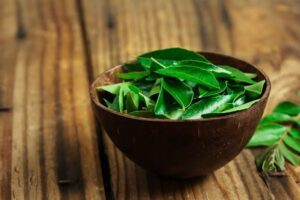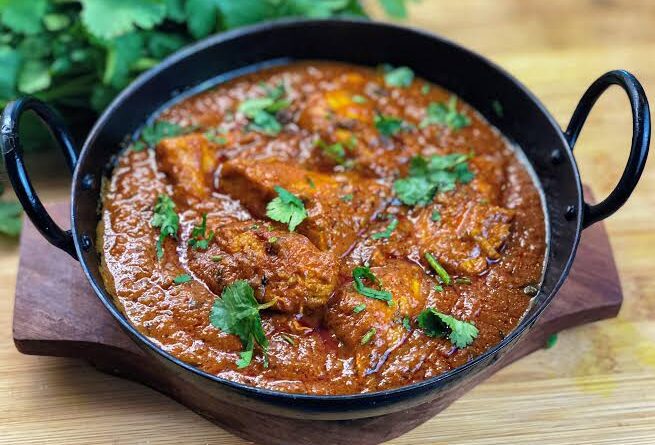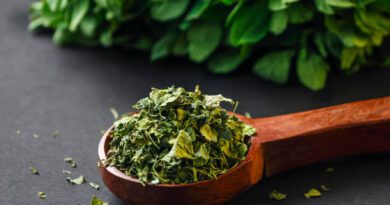Health Benefits and Uses of Curry
Curry is a type of dish that originated in South Asia, particularly in India, and is now enjoyed worldwide. The dish typically consists of a mixture of spices and herbs, which are used to flavor vegetables, meat, or seafood.
The spices used in curry can vary depending on the region and the recipe, but commonly include turmeric, cumin, coriander, ginger, garlic, and chili peppers.
Curry can be prepared in many ways, and the type of curry you get can depend on the ingredients used, the cooking techniques employed, and the region where it is prepared. Some of the popular types of curry include butter chicken, chicken tikka masala, rogan josh, vindaloo, and korma.
Curry is usually served with rice or bread, such as naan or roti. It can be mild or spicy, and is often accompanied by various side dishes, such as raita, chutney, or pickles. Curry is not only delicious, but it is also nutritious, as it is typically made with fresh vegetables, lean protein, and healthy fats like coconut milk or olive oil.
Read Also: Best Ways and Methods to Feed Rabbits
Description of Curry

Curry is a flavorful and aromatic dish that is popular in many cuisines around the world. It typically consists of a mixture of spices, including turmeric, cumin, coriander, ginger, and chili powder, which are combined with a sauce made from onions, tomatoes, and sometimes coconut milk or yogurt.
The specific ingredients and cooking techniques used to make curry can vary greatly depending on the region and the preferences of the cook.
Curry can be made with a variety of meats or vegetables, such as chicken, lamb, beef, fish, potatoes, carrots, and cauliflower, among others. It is often served with rice or bread, such as naan or roti. Different types of curry can range from mild to very spicy, depending on the amount and type of chili used.
Curry has a distinctive flavor and aroma that comes from the combination of spices and other ingredients used in its preparation. It can be savory, slightly sweet, and often has a warming quality due to the presence of spices like ginger and chili.
Curry is known for its vibrant colors and complex flavors, and it is a versatile dish that can be customized to suit different tastes and dietary preferences.
18 Health Benefits of Curry

1. Anti-inflammatory properties: Many of the spices used in curry, such as turmeric and ginger, have anti-inflammatory properties that can help reduce inflammation in the body, which is linked to numerous chronic diseases.
2. Antioxidant properties: Curry contains a variety of spices and vegetables that are high in antioxidants, which can help protect against cell damage and reduce the risk of chronic diseases like cancer and heart disease.
3. May help improve digestion: The spices in curry, including ginger and cumin, may help improve digestion and reduce symptoms like bloating and constipation.
4. May help regulate blood sugar: Some studies have suggested that consuming curry may help regulate blood sugar levels and reduce the risk of diabetes, possibly due to the presence of certain spices.
5. May help reduce the risk of heart disease: The spices in curry, particularly turmeric, may help improve heart health by reducing inflammation and improving cholesterol levels.
6. May help reduce the risk of cancer: The antioxidants and anti-inflammatory compounds in curry may help reduce the risk of certain types of cancer, although more research is needed in this area.
7. May help improve brain function: Some studies have suggested that consuming curry may help improve cognitive function and reduce the risk of Alzheimer’s disease, possibly due to the presence of certain spices.
8. May help reduce the risk of arthritis: The anti-inflammatory properties of curry may help reduce inflammation and pain associated with arthritis, although more research is needed in this area.
9. May help improve skin health: Some of the spices in curry, such as turmeric, may help improve skin health by reducing inflammation and fighting free radicals.
10. May help reduce the risk of obesity: Some studies have suggested that consuming curry may help reduce the risk of obesity by improving metabolism and reducing inflammation.
11. May help improve liver function: Some of the spices in curry, such as turmeric, may help improve liver function by reducing inflammation and oxidative stress.
12. May help improve immune function: The antioxidants and anti-inflammatory compounds in curry may help boost immune function and reduce the risk of infections.
13. May help reduce the risk of asthma: Some studies have suggested that consuming curry may help reduce the risk of asthma by reducing inflammation and improving lung function.
14. May help improve bone health: Some of the spices in curry, such as turmeric, may help improve bone health by reducing inflammation and promoting bone growth.
15. May help reduce the risk of gallbladder disease: Some studies have suggested that consuming curry may help reduce the risk of gallbladder disease by improving liver function and reducing inflammation.
16. May help reduce the risk of kidney disease: The anti-inflammatory and antioxidant properties of curry may help reduce the risk of kidney disease by protecting against oxidative stress and inflammation.
17. May help reduce the risk of depression: Some studies have suggested that consuming curry may help reduce the risk of depression by reducing inflammation and improving brain function.
18. May help reduce the risk of allergies: Some studies have suggested that consuming curry may help reduce the risk of allergies by reducing inflammation and improving immune function.
Read Also: Equipments and Tools Needed in Snail Farming
Uses of Curry

Below are the different uses of curry:
Curry is a popular spice blend and a staple ingredient in many cuisines, especially South Asian cuisine.
It consists of a mixture of spices such as turmeric, cumin, coriander, ginger, cinnamon, and cardamom. Below are some common uses of curry:
Flavoring in Indian dishes: Curry powder is an essential ingredient in Indian cooking, used to flavor a wide range of dishes such as curries, soups, stews, and rice.
Marinade: Curry powder can be mixed with oil and yogurt to create a flavorful marinade for meat, fish, or vegetables.
Seasoning for roasted vegetables: Sprinkling a little curry powder over roasted vegetables like cauliflower, potatoes, or carrots adds a warm and spicy flavor.
Dressing or sauce: Curry powder can be mixed with mayonnaise, yogurt, or sour cream to create a delicious dressing or dipping sauce for salads, sandwiches, or appetizers.
Stir-fry seasoning: Curry powder can be added to stir-fries to add depth and complexity to the flavor profile.
Soup base: Curry powder can be used as a base for soups, such as lentil soup or chicken soup.
Grilled or roasted meats: Curry powder can be used as a dry rub or mixed with a marinade for grilled or roasted meats like chicken, lamb, or pork.
Overall, curry powder is a versatile and delicious spice blend that can add flavor and depth to a variety of dishes.
Making your own Curry Powder
Making your own curry powder is a great way to customize the spice blend to your own tastes and preferences. Here’s a basic recipe for homemade curry powder:
Ingredients:
• 1/4 cup ground cumin
• 1/4 cup ground coriander
• 1/4 cup ground turmeric
• 2 tablespoons ground ginger
• 1 tablespoon ground cinnamon
• 1 tablespoon ground cardamom
• 1 teaspoon ground black pepper
Instructions:
1. Mix all of the spices together in a bowl.
2. Store the curry powder in an airtight container in a cool, dry place for up to six months.
Variations:
1. For a spicier curry powder, add 1-2 teaspoons of cayenne pepper.
2. For a smoky flavor, add 1-2 tablespoons of smoked paprika.
3. For a milder curry powder, reduce the amount of black pepper and cayenne pepper.
Tips:
1. Toasting the whole spices before grinding them can enhance the flavor of the curry powder. Simply heat the whole spices in a dry skillet over medium heat until fragrant, then grind them in a spice grinder or mortar and pestle.
2. Use high-quality spices for the best flavor. Freshly ground spices will have a stronger flavor than pre-ground spices that have been sitting in your pantry for a while.
Read Also: The Basics of Landlord Insurance








